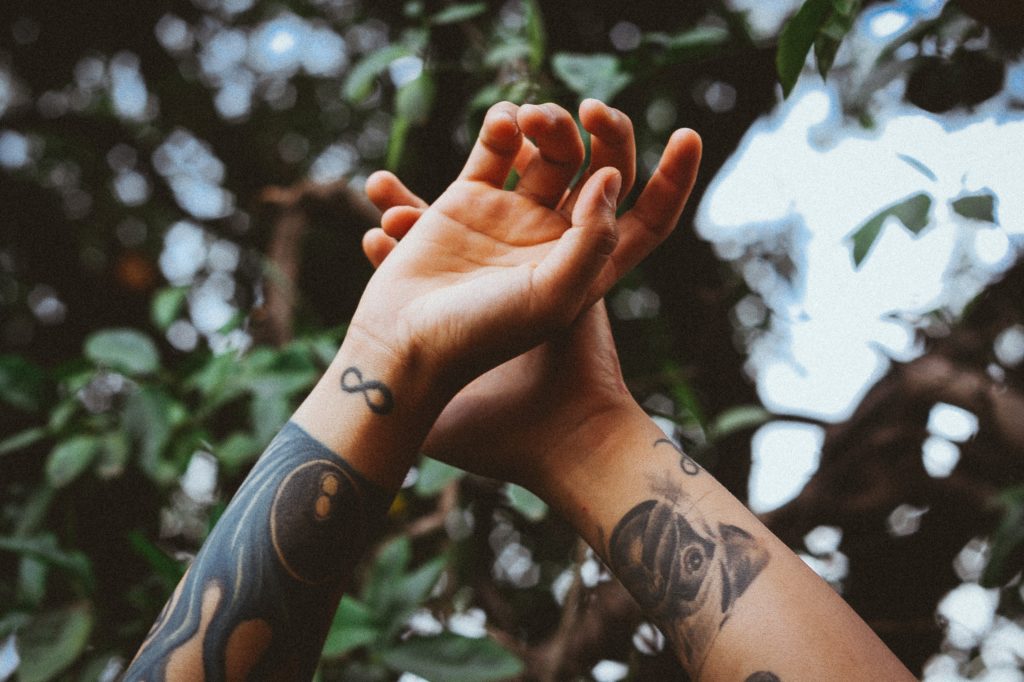There’s literally no such thing as a perfect relationship. No matter how “conscious” we aim to be, our intimate relationships have a way of unearthing our suppressed traumas and triggering our wounds. Our beliefs about love and our worthiness to receive all influence how we show up in partnership, and what we’re willing to accept.
Anyone can find themselves in a “toxic” relationship, and it always takes two to create a dynamic that isn’t healthy. While most articles of this nature focus on what to look for in the other, I’d suggest you take a dual approach here and ask yourself “can I see myself in any of these behaviors”?
We all have the capacity to show up as “toxic” in a relationship. Our shadow-self (the deep, dark unconscious behavior) can wreak havoc if left unchecked.
In this article, we’re going to cover 20 signs that your relationship might be toxic. But there are some caveats.
1. Know that all relationships present their ups and downs. You might recognize you and your partner in one or two of these on occasion – that doesn’t necessarily mean your relationship needs to end. Sometimes, this stuff comes up so we can heal it together. If BOTH people are willing to do the work, you might want to stay in the game a little bit longer.
2. If there’s abuse, there’s never an excuse to stay. Even if the abuser says they are willing to change/get help, the first step is always separation. If any pattern is to change in an abusive dynamic, both of you are going to need to do your own inner-work separate from one another first, and that means the victim must remove themselves from the situation entirely. If you need help to get out safely, you can call the National Domestic Violence Hotline.
3. Everyone acts like a turd sometimes. It’s inevitable, we’re human beings. While some of the points in this article are straight up deal breakers, others point towards something else – the need to do more in-depth ownership work and Heal Your Relationships.
“We cannot make another person change his or her steps to an old dance, but if we change our own steps, the dance can no longer continue in the same predictable pattern.”
Here are 20 Signs of a Toxic Relationship

1. There’s a constant imbalance of energy
There are two types of relationships: the battery relationship and the garden.
The Garden Relationship is also known as a “Conscious Relationship.” In this dynamic, we go beyond you and me and create something outside of both of us – the garden, which we tend to and water daily. In doing this, the garden nourishes us back, allowing us to function at a higher level in the world and share our gifts.
The Battery Relationship is one in which both people have expectations that their needs will be met solely by the other person. There are often a lot of unexpressed wants and desires that aren’t satisfied because there’s an expectation that the other “should just know” what to do, say or how to be.
When the energy is continuously imbalanced in a relationship, one person may be over-involved in the emotions and well-being of the other, while the other is withdrawn and focused on themselves (or in some cases, an addiction.) This is known as “co-dependence, and you can learn more about it in this interview I did with my partner Ben on the Evolving Man Podcast.
2. Lack of trust
Without trust, a relationship has no real foundation. A healthy partnership is a co-creation between two people who embody wholeness in their lives as individuals. If one or both of you lack trust – this is a sign that either a betrayal in a previous relationship wasn’t resolved, or that something from the past (childhood) has been carried over into your present relationship. If you feel you have justified reasons not to trust your partner (infidelity, lying, abuse), you have to decide whether or not you can rebuild trust and safety with this person or if it’s time to let go.
3. You Feel Unsafe in Your Environment
First of all, for those of us who have trauma, we may often have the experience of feeling unsafe even when there’s no real threat. In this case, seeking out support in the form of group therapy, somatic healing and meditation can be immensely soothing for your nervous system.
But feeling unsafe in your environment due to a person who poses a threat to you emotionally or physically is a deal breaker. Living with someone who abuses substances, acts out in anger, breaks things, punches walls, uses insults or demeaning behavior in conflict is never ok.
If this is true for you, it’s important to remove yourself and find a safe place where you can do recovery work and create a deeper sense of self and form healthier boundaries.
4. Your Partner is Predictably Unreliable
If the only thing you can rely on your partner for is to not do what they say they’re going to do, or be late, something in the relationship has to shift.
There are some reasons why this may be happening – ADD/ADHD, for example, is a very common behavioral disorder that can make being on time and remembering things more difficult. If this is the case, and you really want your partnership to work, you may want to learn about how your partner’s brain works and then get together to make a game plan for how you’re both going to make things work. For example, creating a shared calendar, having a whiteboard in the kitchen can help.
Other times, an unreliable person is simply avoidant or doesn’t have the emotional capacity to consider anyone outside of themselves. As much as this sucks, sometimes we have to acknowledge that not everyone is going to be ready or willing to make your relationship a priority. Ultimately, the person who’s presenting as unreliable has to want to alter the way they show up in the relationship and become an active participant in making things work; otherwise, there’s no hope for change.

5. Lack of Communication
Can you talk about your fears or conflicts as they arise or do things get swept under the rug and ignored completely? Do you try to connect with your partner and hit a wall? These are all signs of an avoidant type. Firstly, consider how you’re showing up in the relationship – are you giving this person space to show up or are you constantly filling the space, so they don’t have to?
When we invite someone to meet us, we have to take a step back far enough that they have the opportunity to move towards us. Anxious types have the most difficult time with this – but it’s what enables the anxious/avoidant pattern to continue.
Lack of communication requires two people willing to put in the effort to learn how to speak each other’s language. A mature relationship is built on a solid foundation of loving, non-violent communication. The keyword is “curiosity,” where you both possess a compassionate curiosity about one another’s internal experience.
If you can’t talk about your feelings openly, give and received feedback and process conflict in a safe and healthy way – the relationship needs work. If there’s a willingness, there’s still hope, but without it, this relationship isn’t going anywhere.
6. Control or Jealousy Issues
Control and jealousy issues can be red flags for potential chaos and abuse to manifest inside the relationship. If the closer you get, the more controlling and jealous your partner becomes, this is a big concern. In this type of situation, move slowly. Maintain your own homes (don’t move in together), join bank accounts or do anything that would potentially put you in a situation where you couldn’t get out in a hurry. Often times, people who present as controlling or jealous and paranoid in a relationship have serious trust issues and may have even been victims of abuse or violence in their past. If they haven’t done their own healing work, they may carry that learned behavior into your relationship.
Unless we’re talking about an agreed upon BDSM container where power dynamics are at play in a contained setting, a healthy relationship never plays out a dynamic where one person is “in control” of the other person.
Having friends and community outside of the relationship is essential. You cannot get all of your needs met by one person. Expecting someone to devote all of their time and energy solely to one person is intensely co-dependent behavior. If a person attempts to create isolation, distancing, or mistrust between you and the people you’re close to, walk away.
A supportive partner will encourage their significant other to spend time with their friends and enjoy a life of their own outside of the relationship because they know this only strengthens an intimate relationship.
7. Blaming and Shaming
Ahhh the blame game, such a good one! Just kidding, it’s a boring game and we’re all guilty of playing it sometimes. But seriously, blaming and shaming is toxic behavior, and it has no place in a relationship. Conflict will inevitably arise, this is a given, but how we show up when we’re triggered can make or break the foundation of trust we have with our partners.
Blanket terms like “always and never” can be used to deflect personal responsibility and put the blamee into a state of confusion and low-self worth. No one is free from this type of shadow behavior, and we’ve all likely blamed or shamed in a relationship at one point or another, but when it’s a consistent pattern – that’s a big fat red flag. It’s essential for both people to take full responsibility for their emotions and triggers.
We can switch the conversation from toxic to conscious by taking a pause and recentering our language to what our underlying emotion or need is:
“I’m feeling frustrated and angry.”
“I want you to hear me right now.”
“I’m afraid that you don’t value what I have to say.”
“I’m feeling really hurt and I want to run away right now”.
If you’re locked in a blame/shame pattern that’s impacting your self-esteem, this can be a form of emotional abuse. Pay attention to the signs and remember, if your partner isn’t willing to take ownership over their behavior, it might be time to draw a line in the sand.

8. You Have to Abandon Yourself to Make it Work
If you have to abandon yourself for the relationship to work, that’s not love. All relationships require compromise, but that should never apply to our core values or our needs for physical and emotional safety and security. A healthy partnership never asks us to act against what feels self-honoring to maintain or keep the love. So many of us were taught to give endlessly and to be “needless” when it comes to relationships. But when you ask healthy people what makes their relationship great – they will usually tell you it’s things like
- Prioritizing self-care and time to tune inward
- Making time to nourish friendships outside of the relationships
- Creating space for both people to express themselves openly and vulnerable
- Learning how to speak a shared language rather than expecting the other person to “just know” or punishing them for misreading an interaction
If you experienced abuse or neglect in early childhood, it’s possible that your people-pleasing tendencies get you into situations where your needs are last on the list. Be aware if this unconscious pattern is playing out and take action to become more in tune with who you are, what you want, and what your needs are in a relationship.
9. They Lie to You
Lying and secrets erode a relationship and create distance between partners. We’re not talking about white lies here, like whether or not your partner likes your outfit.
Big lies that create separation and cause hurt or a break in trust can permanently damage your connection. Often times, lying seeds doubt and mistrust in the person being lied to which in turn creates a spiral downward into low self-esteem, jealousy and paranoia.
Honesty allows for vulnerability and intimacy to deepen in a relationship, without it, there’s not much left.
10. Becoming Isolated from Friends and Family
This is probably one of the most significant red flags there is. Distancing from the people you love and are close to when you enter a romantic relationship is very unhealthy behavior.
This pattern is quite common when there’s a codependent or abusive dynamic at play. An abuser will do whatever they can to gain full control, and being isolated from external support is a major strategy. If your partner is jealous or tries to form a wedge between you and your loved ones, danger may be lurking.
If you’re embarrassed for your friends and family to be around your partner because of how they speak about you or treat you, then that’s a real issue. A healthy partnership is one that encourages intimacy and connection not just between one another, but with your friends and family.
A community can strengthen any partnership and make you both better people. Find people you feel safe connecting with and develop relationships outside of your primary romantic bond.
11. Holding Each Other Back from Growth
There’s a little monster in all of us and it can subconsciously sabotage our relationships. When self-worth is low, we may feel threatened by the idea of our partner “outgrowing us” with all that personal growth work they’re doing.
If you find your partner being critical, judgemental or using ultimatums when it comes to seeking to know yourself on an emotional or spiritual level – the first thing to understand is that it’s not about you. This is their own insecurity and lack of self-worth or willingness playing out, and you do not have to operate at that level.
The next question to ask yourself, is, are you willing to remain in a partnership where you feel unsupported? Everyone is unique, and it’s unfair to expect that your partner will want to participate in everything you do, but there’s a difference between not being interested, and making it more difficult for you to engage in the work yourself.
If you have to choose between doing inner-work and maintaining your relationship, that’s an unfair sacrifice and it might be time to walk away.
12. Your Friends and Family Are Worried
When our friends and family are worried about our safety and well-being in a relationship, our first instinct may be to defend. It might even activate our inner rebellion – but it’s worth giving a bit of energy. Here’s why: sometimes, our friends or family have a distorted perspective, they’re not always going to be right. But sometimes, the people who know us well can sense when something is off, or when a person is unsafe.
If we’re high on love-hormones, we might not pick up on the red flags going up that our friends and family members do. Outside opinions are certainly not the whole picture, but if everyone is questioning your safety, tune inward and ask yourself – is there some truth to their concerns? Am I ignoring the obvious red flags because I want to be right? Do I think I can change this person?
Be honest with yourself. It’s your job to protect and love yourself the way you would your own child.
13. Score-Keeping
Keeping a tally sheet of all of the things we do for our partners so we can hold it over their head later creates dysfunction and separation. Alternatively, if we hold on to our partners’ mistakes and use them as a way to shame or blame them later on, this is just another version of scorekeeping that causes harm and erodes trust.

14. Boundary Violations
Love without boundaries quickly leads to blurred lines and unhappiness. If we fail to set boundaries, our partner may violate our boundaries without ever having the opportunity to be aware of what they are. For this reason, it’s vital we learn how to set Conscious Boundaries and communicate our needs. This way, our partner has a real chance to show up for us in the way we desire.
On a more serious note, some behavior is a deal-breaker regardless of whether or not you’ve set a boundary, because it’s totally unacceptable in the first place.
How do you know if your boundaries are being violated in a serious way?
- They don’t stop when you ask them to
- They dismiss you frequently or call you names
- They take advantage of your trust (lying, cheating, stealing)
- They don’t respect your personal space, belongings or physical body
- You feel unsafe in your environment
15. They Trash Talk All of Their Exes
There is such thing as an awful ex – no doubt. But how someone talks about their exes can be extremely revealing to how they relate to the world. If someone constantly trash talks their ex, this points to a few things: they may not actually have dealt with their anger towards their ex-partners, and as a result, that will carry forward into their relationship with you.
Additionally, if all of their exes are somehow “crazy, insane, and psycho” you’ll want to watch out because this might actually mean that the person your dating is the real problem. Using labels like “always, crazy, insane, psycho and so on” can indicate a lack of personal responsibility and ownership for one’s behavior. Consider what your conflicts may look like with a person who’s never to blame.
A person who’s integrated with their anger and other emotions will be able, to be honest with you about their past relationships and even if their ex was awful to them, they will be able to share what lessons they personally got out of the relationship or what they’ve done to heal.
16. You Wonder How They Feel About You
If your partner doesn’t openly and honestly express their feelings for you – something might be lacking. If they leave you hanging after you show your vulnerability, or you constantly wonder “where you stand” in the relationship, this person has way too much power in the dynamic. A healthy relationship looks like two adults, who can have clear, open and honest conversations about what each of you wants in the relationship and what you want from each other. If the person you’re dating refuses to have these conversations with you, don’t waste your time.
17. They Use Your Vulnerability Against You
If you’ve expressed something vulnerable in the relationship only to have it used against you later in conflict, this is a form of emotional abuse. Using your past trauma, mistakes, or fears as a way to guilt or shame you is never ok. I repeat: never ok.
18. You Play Cat and Mouse
If you take turns playing the cat and mouse game – you might be playing into each other’s wounds and bringing out the worst in each other. When we have an abandonment wound, we can romanticize rejection and chase someone who isn’t good for us. We might even wind up in relationships that are “off and on” a lot because the chase activates a part of us that seeks external validation and love.
Unless you’re both two-feet in, you’re wasting each others time. Playing the avoidant game is a distraction from feeling our hurt and doing the work that needs to be done to create a healthy connection with someone.
19. They bring out the worst in you
Do you relapse into old behavioral or substance patterns when you’re together? Do you spend your time eating unhealthy foods or drinking alcohol to numb out? A toxic relationship can bring out the worst in us, causing us to get lost in our shadow self. If you feel like you’re the worst version of yourself when you’re with them (or they with you), then something needs to shift swiftly, and it’s possible this just isn’t the right relationship for you.

20. Sex Feels Transactional
There are a few things to look for here, and some are deal breakers while others point towards the need for you and your partner to engage in healing work together.
Let’s start with the deal breakers: If you feel like you’re being “used” for your body, or if you use sex as a way to keep your partner from exploding or reacting, this is transactional sex. No one should ever have to exchange their body to feel safe.
Work to do: If your sexual relationship is laced with guilt/pressure or withholding, this is a problem, but it’s also something that comes up for a lot of couples. Many relationships have intimacy challenges, and this doesn’t necessarily mean you need to end the relationship. Real intimacy is rooted in mutual pleasure and open lines of communication.
If one or both of you carry sexual wounding (previous sexual abuse, assault or religious programming), you may need to engage in deeper healing work on your own and together to co-create a healthy sex life.
Now that you know the signs, you can take action to understand the roots of your relationship patterns.
All relationships take work, even the very best of ones. However, remaining in a toxic dynamic in hopes that you can change or save someone is a draining and hopeless endeavor. The best chance we have at attracting and keeping healthy love in our lives is to strengthen our relationship to self. As we learn to honor ourselves, set boundaries, and self-soothe, our relationships can thrive.

